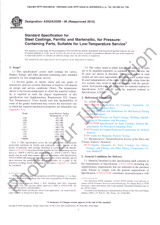Wir benötigen Ihre Einwilligung zur Verwendung der einzelnen Daten, damit Sie unter anderem Informationen zu Ihren Interessen einsehen können. Klicken Sie auf "OK", um Ihre Zustimmung zu erteilen.
ASTM F2852-19
Standard Practice for Training a Land Search Tracker
Name übersetzen
NORM herausgegeben am 1.12.2019
Informationen über die Norm:
Bezeichnung normen: ASTM F2852-19
Ausgabedatum normen: 1.12.2019
SKU: NS-982076
Zahl der Seiten: 5
Gewicht ca.: 15 g (0.03 Pfund)
Land: Amerikanische technische Norm
Kategorie: Technische Normen ASTM
Kategorie - ähnliche Normen:
Die Annotation des Normtextes ASTM F2852-19 :
Keywords:
search, track,, ICS Number Code 03.100.30 (Management of human resources), 13.200 (Accident and disaster control)
Ergänzende Informationen
| Significance and Use | ||||||||
|
4.1 This guide establishes the minimum knowledge, skills, and abilities that a person must have to perform as a Tracker. No other skills are included or implied. 4.2 Every person who is identified as a Tracker shall have met the requirements of this guide. 4.2.1 Nothing in this guide precludes the AHJ from adding additional requirements for its personnel. 4.3 Training to this guide is not an indication that a person possesses adequate field skills or knowledge to make mission critical decisions. 4.4 Though this guide establishes a basic training standard, it does not imply that a Tracker is a “trainee,” “probationary,” or other similar team member designation of an organization. 4.4.1 Determining the requirements and qualifications for a Tracker is the responsibility of the AHJ. 4.5 This guide does not stand alone and must be used with the referenced documents to provide the specific information needed by a Tracker or AHJ. 4.6 This guide by itself is not a training document. It is an outline of the topics required for training or evaluating Tracker endorsed personnel. 4.7 This guide can be used to evaluate a book or other document to determine if its content includes the information required for training a Tracker. Likewise, this guide may be used to evaluate an existing training program to see if it meets the requirements of this guide. 4.8 The knowledge, skills, and abilities defined in this guide are not presented in any particular order and do not represent a training sequence. 4.9 A Tracker shall document his or her training, as directed by the AHJ, which might include the completion of a position task book, compliant with Guide F3068, or by field demonstration under qualified supervision. 4.9.1 Unless stated otherwise, an ability or proficiency in a skill shall be demonstrated for initial qualification and then as often as required by the AHJ. 4.9.2 Except where a physical skill or ability must be demonstrated, the AHJ shall determine the best way to evaluate a person’s knowledge. This may be by written exam, oral exam, field demonstration, or by some combination of the three. |
||||||||
| 1. Scope | ||||||||
|
1.1 This guide establishes the minimum training, including knowledge, skills, and abilities, required for personnel operating as Trackers in support of a land search effort. 1.2 A Tracker Endorsement alone is not sufficient to indicate that an individual has the knowledge, skills, or abilities to perform any specific duties, including search and rescue operations, beyond those defined within this guide. 1.3 A Tracker tracks on the surface of the land only, including urban or disaster areas that may be isolated or have lost supporting infrastructure. 1.4 This guide does not provide the minimum training requirements for tracking in partially or fully collapsed structures, in water, in confined spaces, or underground (such as in caves, mines, and tunnels). 1.5 Human land SAR resources that may utilize personnel trained to this guide are classified in Classification F1993. 1.5.1 Individuals trained to this guide are qualified to operate on teams or crews classified as Category – Land Search of Kind – Tracking. 1.5.2 Further training may be required before Tracking Land Search personnel may participate on particular Category or Kind of SAR resource, depending on local needs, regulations, or policies of the Authority Having Jurisdiction (AHJ). 1.6 This standard does not purport to address all of the safety concerns, if any, associated with its use. It is the responsibility of the user of this standard to establish appropriate safety, health, and environmental practices and determine the applicability of regulatory limitations prior to use. 1.7 This international standard was developed in accordance with internationally recognized principles on standardization established in the Decision on Principles for the Development of International Standards, Guides and Recommendations issued by the World Trade Organization Technical Barriers to Trade (TBT) Committee. |
||||||||
| 2. Referenced Documents | ||||||||
|



 Cookies
Cookies
